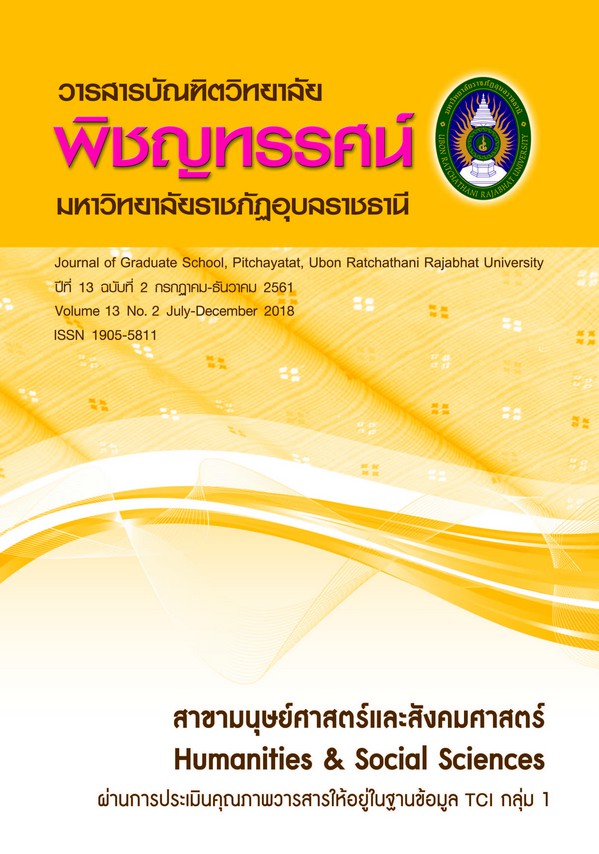รูปแบบการระดมทรัพยากรเพื่อจัดตั้งศูนย์การเรียนรู้ภูมิปัญญาการปั้น ชุมชนท่าไห อำเภอเขื่องใน จังหวัดอุบลราชธานี
คำสำคัญ:
การระดมทรัพยากร, การจัดตั้งศูนย์การเรียนรู้, กระบวนการมีส่วนร่วม, ภูมิปัญญาท้องถิ่นบทคัดย่อ
การวิจัยครั้งนี้ มีวัตถุประสงค์ เพื่อหารูปแบบการระดมทรัพยากรสำหรับจัดตั้งศูนย์การเรียนรู้ภูมิปัญญา การปั้น ชุมชนท่าไห อำเภอเขื่องใน จังหวัดอุบลราชธานี กลุ่มตัวอย่างที่ใช้ในการวิจัย จำนวน 46 คน ใช้วิธีคัดเลือกกลุ่มตัวอย่างแบบเจาะจง ได้แก่ ตัวแทนชุมชนและภาคส่วนต่าง ๆ ภายในชุมชน ได้แก่ ผู้นำชุมชน จำนวน 6 คน ปราชญ์ชุมชน จำนวน 8 คน เยาวชน จำนวน 10 คน องค์กรปกครองส่วนท้องถิ่น จำนวน 2 คน หมู่บ้าน จำนวน 13 คน โรงเรียน จำนวน 4 คน พระสงฆ์ จำนวน 1 รูป ศูนย์การเรียนรู้คนไทยวันนี้ จังหวัดอุบลราชธานี จำนวน 1 คน และศูนย์การเรียนรู้ห้วยวังนอง จังหวัดอุบลราชธานี จำนวน 1 คน เครื่องมือที่ใช้ในการวิจัยได้แก่ แบบสัมภาษณ์เชิงลึกแบบกึ่งโครงสร้าง การสรุปผลใช้การวิเคราะห์ข้อมูลและเชื่อมโยงความสัมพันธ์ระหว่างกลุ่มข้อมูลโดยการพรรณนา ผลการวิจัยพบว่า รูปแบบการระดมทรัพยากรสำหรับจัดตั้งศูนย์การเรียนรู้ ภูมิปัญญาการปั้น ชุมชนท่าไห อำเภอเขื่องใน จังหวัดอุบลราชธานี ประกอบด้วย 1) งบประมาณในการบริหารจัดการ ภายในศูนย์การเรียนรู้ ซึ่งแนวทางในการระดมทุนประกอบด้วย รูปแบบผ้าป่าสามัคคีของชุมชนและการขอรับการจัดสรรงบประมาณเพื่อพัฒนาชุมชนจากองค์การบริหารส่วนตำบลและภาคส่วนอื่นๆ ที่เกี่ยวข้อง 2) รูปแบบการดำเนินการของศูนย์การเรียนรู้ ที่เน้นการทำกิจกรรมอย่างต่อเนื่อง โดยโรงเรียนและชุมชนร่วมมือจัดทำหลักสูตรการปั้น เพื่อให้นักเรียน เยาวชนในชุมชนหรือผู้ที่สนใจ ได้เรียนรู้ ซึ่งใช้เวลาในช่วงกิจกรรมลดเวลาเรียนเพิ่มเวลารู้ 3) สถานที่ดำเนินการจัดตั้งศูนย์การเรียนรู้ ใช้พื้นที่หมู่ 1 บ้านท่าไห มีเนื้อที่ประมาณ 2 ไร่ 1 งาน ซึ่งได้เป็นส่วนรับผิดชอบขององค์การบริหารส่วนตำบลท่าไห 4) บุคลากรดำเนินการในศูนย์การเรียนรู้ เน้นให้ชุมชนมีส่วนร่วม โดยเลือกคนในชุมชนและตัวแทนจากภาคส่วนต่าง ๆ ภายในชุมชน 5) รายได้ของศูนย์ เกิดจากการขายผลิตภัณฑ์เครื่องปั้นดินเผาให้กับผู้ประกอบการเครื่องปั้นดินเผาและผู้สนใจ
เอกสารอ้างอิง
กฤตวรรณ สรรพอาษา. ความสำเร็จของการบริหารศูนย์การเรียนชุมชนกรณีศึกษา ศูนย์การเรียนชุมชนบ้านมอดินแดง จ.อุดรธานี.เรียนรู้ชุมชน อำเภอสามโคก จังหวัดปทุมธานี. กาประชุมเสนอผลงานวิจัยระดับบัณฑิตศึกษา มหาวิทยาลัยสุโขทัยธรรมาธิราช ครั้งที่ 2; 4-5 กันยายน 2555; อาคารสัมมนา 1-2 มหาวิทยาลัยสุโขทัยธรรมาธิราช.บัณฑิตศึกษา มหาวิทยาลัยสุโขทัยธรรมาธิราช: บัณฑิตศึกษา, 2555.
สุปิยา ทาปทา. ไห : วิถีคิด วิถีชีวิตที่เปลี่ยนไป. วัฒนศิลปสาร. 4, 1(มกราคม-มิถุนายน 2552): 1-114.
องค์การบริหารส่วนตำบลท่าไห. ประวัติบ้านท่าไห. (ออนไลน์) 2558 (อ้างเมื่อ 1 พฤษภาคม 2561).จาก: http://www.thahai.go.th/thahai/index.php/th/2013-11-11-06-17-32/2014-09-08-02-15-09.
ดาวน์โหลด
เผยแพร่แล้ว
รูปแบบการอ้างอิง
ฉบับ
ประเภทบทความ
สัญญาอนุญาต
บทความทุกเรื่องได้รับการตรวจความถูกต้องทางวิชาการโดยผู้ทรงคุณวุฒิภายนอกอย่างน้อย 3 คน ความคิดเห็นในวารสารพิชญทรรศน์เป็นความคิดเห็นของผู้นิพนธ์มิใช่ความคิดเห็นของผู้จัดทำ จึงมิใช่ความรับผิดชอบของวารสารพิชญทรรศน์ และบทความในวารสารพิชญทรรศน์สงวนสิทธิ์ตามกฎหมายไทย การจะนำไปเผยแพร่ต้องได้รับอนุญาตเป็นลายลักษณ์อักษรจากกองบรรณาธิการ





